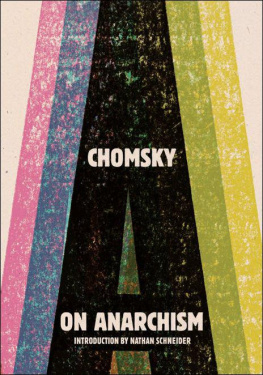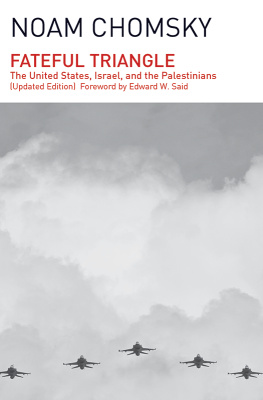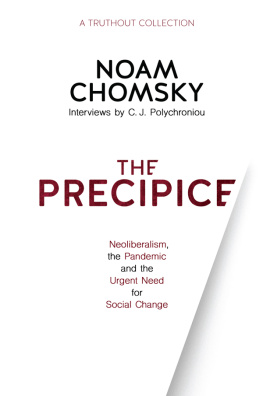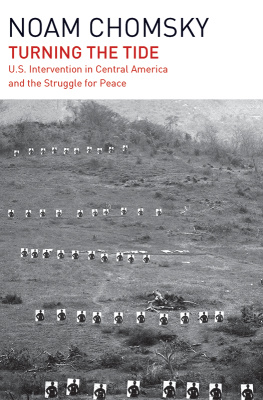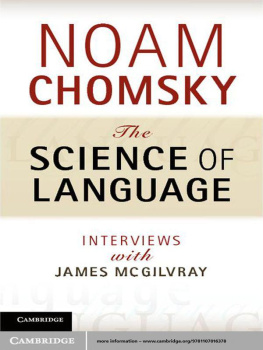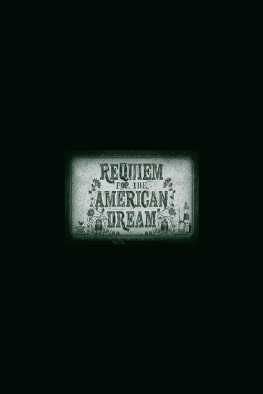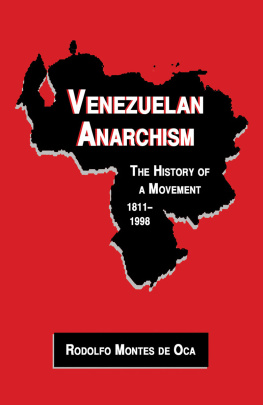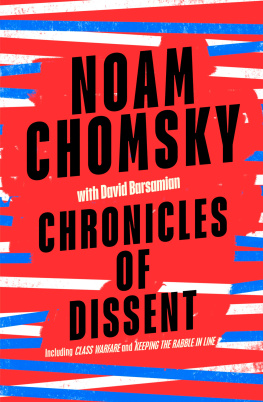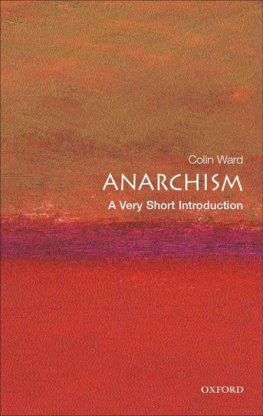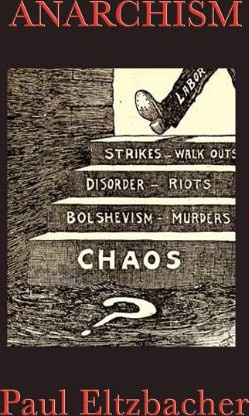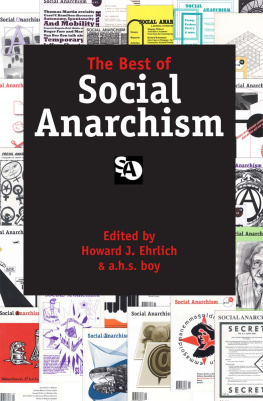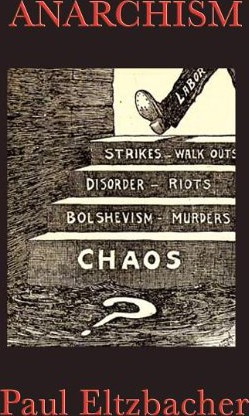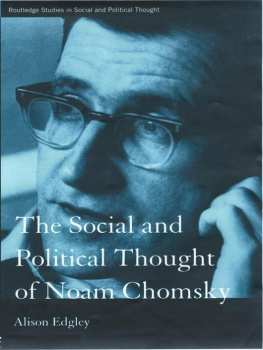Noam Chomsky is Institute Professor emeritus of linguistics at MIT and the author of numerous books including Towards a New Cold War, The Chomsky-Foucault Debate, On Language, and Objectivity and Liberal Scholarship (all available from The New Press). He lives in Lexington, Massachusetts.
Nathan Schneider is the author of Thank You, Anarchy: Notes from the Occupy Apocalypse and God in Proof: The Story of a Search from the Ancients to the Internet. He also edits the online publications Waging Nonviolence and Killing the Buddha. He lives in Brooklyn, New York.
OTHER TITLES BY NOAM CHOMSKY AVAILABLE FROM THE NEW PRESS
The Essential Chomsky
On Language: Chomskys Classic Works
Language and Responsibility and Reflections on Language
The Chomsky-Foucault Debate:
On Human Nature (with Michel Foucault)
Objectivity and Liberal Scholarship
Towards a New Cold War: U.S. Foreign
Policy from Vietnam to Reagan
For Reasons of State
Problems of Knowledge and Freedom
American Power and the New Mandarins:
Historical and Political Essays
Understanding Power: The Indispensable Chomsky
(edited by Peter R. Mitchell and John Schoeffel)
On Anarchism
Noam Chomsky

NEW YORK
LONDON
Copyright 2013 by Noam Chomsky
Introduction 2013 by Nathan Schneider
All rights reserved.
No part of this book may be reproduced, in any form, without written permission from the publisher.
Requests for permission to reproduce selections
from this book should be mailed to:
Permissions Department, The New Press,
38 Greene Street, New York, NY 10013.
constitute an extension of this copyright page.
Published in the United States by The New Press, New York, 2013
Distributed by Perseus Distribution
LIBRARY OF CONGRESS CATALOGING-IN-PUBLICATION DATA
Chomsky, Noam.
On anarchism / Noam Chomsky.
pages cm.
Includes bibliographical references.
ISBN 978-1-59558-951-4 (e-book)
1. AnarchismHistory. I. Title.
HX828.C52 2013
335'.83dc23
2013022620
The New Press publishes books that promote and enrich public discussion and understanding of the issues vital to our democracy and to a more equitable world. These books are made possible by the enthusiasm of our readers; the support of a committed group of donors, large and small; the collaboration of our many partners in the independent media and the not-for-profit sector; booksellers, who often hand-sell New Press books; librarians; and above all by our authors.
www.thenewpress.com
Composition by dix!
This book was set in Electra
2 4 6 8 10 9 7 5 3
CONTENTS
Anarcho-Curious?
or, Anarchist Amnesia
Nathan Schneider
The first evening of a solidarity bus tour in the West Bank, I listened as a contingent of college students from around the United States made an excellent discovery: they were all, at least kind of, anarchists. As they sat on stuffed chairs in the lobby of a lonely hotel near the refugee camp in war-ravaged Jenin, they probed one anothers political tendencies, which were reflected in their ways of dressing and their most recent tattoos. All of this, along with stories of past trauma, made their way out into the light over the course of our ten-day trip.
I think I would call myself an anarchist, one admitted.
Then another jumped into the space this created: Yeah, totally.
Basic agreement about various ideologies and idioms ensuedableism, gender queerness, Zapatistas, black blocs, borders. The students took their near unison as an almost incalculable coincidence, though it was no such thing.
This was the fall of 2012, just after the one-year anniversary of Occupy Wall Street. A new generation of radicals had experienced a moment in the limelight and a sense of possibilityand had little clear idea about what to do next. They had participated in an uprising that aspired to organize horizontally, that refused to address its demands to the proper authority, and that, like other concurrent movements around the world, prided itself on the absence of particular leaders. One couldnt call the Occupy movement an anarchist phenomenon per se; though some of its originators were self-conscious and articulate anarchists, most who took part wouldnt describe their objectives that way. Still, the mode of being that Occupy swept so many people into with its temporary autonomous zones in public squares nevertheless left them feeling, as it was sometimes said, anarcho-curious.
The generation most activated by Occupy is one for which the Cold War means everything and nothing. We came to consciousness in a world where communism was a doomed proposition from the get-go, vanquished by our Reagan-esque grandfathers and manifestly genocidal to boot. Capitalism won fair and square: market forces work. A vaguer kind of socialism, such as what furnished the functional train systems that carried us on backpacking trips across Europe, still held some appeal. Yet the word socialism has been so thoroughly tarnished in the hegemonic sound bites of Fox News as to be obviously unusable politically. Its also the word Fox associates with Barack Obama, whom this generations door-knocking helped elect but whose administration strengthened the corporate oligarchy, waged unaccountable robot wars, and imprisoned migrant workers and heroic whistleblowers at record rates. So much for socialism.
Anarchism, then, is a corner backed into rather than a conscious choicean apophatic last resort, and a fruitful one. It permits being political outside the red-and-blue confines of what is normally referred to as politics in the United States, without being doomed to a major partys inevitable betrayal. We can affirm the values weve learned on the Internettransparency, crowd-sourcing, freedom to, freedom from. We can be ourselves.
Anarchy is the political blank slate of the early twenty-first century. It is shorthand for an eternal now, for a chance to restart the clock. Nowhere is this more evident than in the anarchic online collective Anonymous, whose only qualification for membership is having effaced ones identity, history, origins, and responsibility.
This anarchist amnesia that has overtaken radical politics in the United States is a reflection of the amnesia in U.S. politics generally. With the exception of a few shared mythologies about our founding slaveholders and our most murderous wars, we like to imagine that everything we do is being done for the very first time. Such amnesia can be useful, because it lends a sensation of pioneering vitality to our undertakings that the rest of the history-heavy world seems to envy. But it also condemns us to forever reinvent the wheel. And this means missing out on what makes anarchism worth taking seriously in the end: the prospect of learning, over the course of generations, how to build a well-organized and free society from the ground up.
Our capacity to forget is astonishing. In 1999, a horizontal spokes council organized the protests that helped shut down the World Trade Organization meeting in Seattle. Just over a decade later, a critical mass of Occupy Wall Street participants considered such a decision-making structure an illegitimate and intolerably reformist innovation.
, by which the anarchist popular revolution under way during the Spanish Civil War was deftly erased from history.
Anarchisms slate is really anything but blank. In this book Noam Chomsky plays the role of an ambassador for the kind of anarchism that were supposed to have forgottenthat has a history and knows it, that has already shown another kind of world to be possible. He first encountered anarchism as a child in New York, before World War II succeeded in making capitalist-against-communist Manichaeism the unquestioned civil religion of the United States. He could find not just Marx but also Bakunin in the book stalls. He witnessed a capitalist class save itself from Depression-era ruin only by creating a social safety net and tolerating unions. The Zionism he was exposed to was a call to agrarian collectivism, not to military occupation.
Next page
